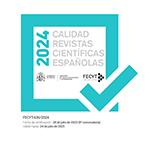¿Tiene la autoconciencia un fundamento lingüístico? Ernst Tugendhat y la Escuela de Heidelberg
Resumen
La aclaración de la estructura de la autoconciencia es crucial en el debate entre los partidarios del “giro lingüístico” y los defensores de la “filosofía de la conciencia”, pues si quedase probado que la autoconciencia tiene un fundamento lingüístico, el lenguaje se infiltraría hasta la raíz misma de la subjetividad. Teniendo presente esta pregunta fundamental, este artículo examina la polémica entre Ernst Tugendhat y los autores de la Escuela de Heidelberg (dieter Henrich y Manfred Frank). Tugendhat concibe la autoconciencia como un fenómeno esencialmente lingüístico, mientras que la Escuela de Heidelberg detecta en la teoría de Tugendhat las dificultades de la concepción clásica de la autoconciencia como reflexión. Tras estudiar los argumentos de una y otra parte, el artículo concluye señalando la simetría de ambos enfoques, e indica brevemente las tareas que debería resolver una teoría alternativa: la distinción de diversos niveles de autoconciencia, y la aclaración de la relación entre el nivel prelingüístico y el nivel conceptual.
Descargas
Descarga artículo
Licencia
La revista Logos. Anales del Seminario de Metafísica, para fomentar el intercambio global del conocimiento, facilita el acceso sin restricciones a sus contenidos desde el momento de su publicación en la presente edición electrónica, y por eso es una revista de acceso abierto. Los originales publicados en esta revista son propiedad de la Universidad Complutense de Madrid y es obligatorio citar su procedencia en cualquier reproducción total o parcial. Todos los contenidos se distribuyen bajo una licencia de uso y distribución Creative Commons Reconocimiento 4.0 (CC BY 4.0). Esta circunstancia ha de hacerse constar expresamente de esta forma cuando sea necesario. Puede consultar la versión informativa y el texto legal de la licencia.











